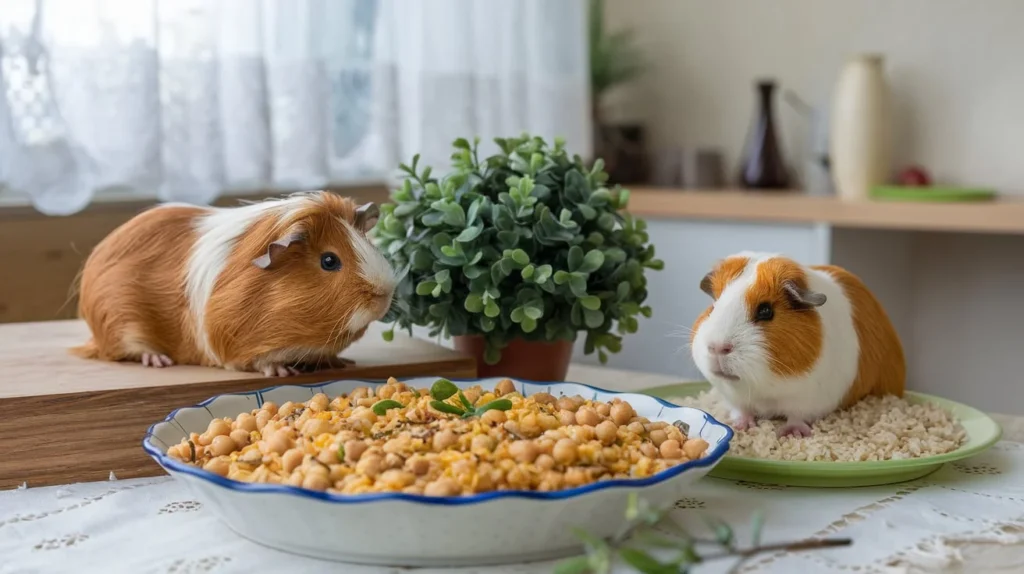Guinea pigs are adorable, social creatures that require a well-balanced diet to stay healthy. As a responsible pet owner, you may wonder, can guinea pigs eat dill? This herb is a staple in many human diets, but is it safe for your furry friend?
In this guide, we’ll explore the nutritional benefits, potential risks, and feeding guidelines for giving dill to guinea pigs.
Nutritional Profile of Dill
Dill (Anethum graveolens) is an aromatic herb packed with essential nutrients. Below is a nutritional breakdown of dill per 100 grams:
| Nutrient | Amount |
| Vitamin C | 85 mg |
| Fibre | 2.1 g |
| Calcium | 208 mg |
| Sugar | 0.6 g |
| Water | 86% |
| Protein | 3.5 g |
Key Takeaways:
- Dill is rich in vitamin C, which is vital for guinea pigs.
- It contains moderate fibre, supporting digestion.
- High calcium content means it should be fed in moderation.
- Low sugar content makes it a safer treat than high-sugar fruits.
Health Benefits of Dill for Guinea Pigs
Vitamin C: An Essential Nutrient
Vitamin C is crucial for guinea pigs because they cannot produce it naturally. Without enough vitamin C, guinea pigs can develop scurvy, a condition leading to weakness, swollen joints, and loss of appetite.
Dill vs. Other Vitamin C Sources
| Food | Vitamin C per 100g |
| Dill | 85 mg |
| Bell Peppers | 127 mg |
| Parsley | 133 mg |
| Oranges | 53 mg |
While dill contains a good amount of vitamin C, it’s not the best source compared to other veggies like bell peppers and parsley.
Fibre: Aiding Digestive Health
Fibre plays a key role in maintaining a healthy gut for guinea pigs. It promotes smooth digestion and prevents issues like bloating or constipation. Dill provides some fibre but is not as fibrous as hay, which should remain their primary food source.
Calcium: Bone Health vs. Risk of Bladder Stones
Calcium is necessary for strong bones, but too much calcium can be harmful to guinea pigs. Excess calcium can lead to bladder or kidney stones, which are painful and sometimes require surgery.
High-Calcium Foods to Limit
- Parsley (138 mg per 100g)
- Dill (208 mg per 100g)
- Spinach (99 mg per 100g)
Since dill has a high calcium content, it should only be an occasional treat rather than a daily food.
Sugar Content: Safe for Guinea Pigs?
Unlike fruits, dill contains very little sugar, which makes it a safe herb for guinea pigs in moderation. High sugar intake can lead to obesity and diabetes, but dill’s low sugar content ensures it won’t contribute to these problems.
Risks and Precautions
Can Too Much Dill Cause Health Problems?
Overfeeding dill can lead to:
- Calcium buildup → Risk of bladder stones.
- Digestive upset → Some guinea pigs may experience bloating or diarrhea.
- Allergic reactions → Though rare, some guinea pigs might be sensitive to dill.
Are There Any Guinea Pigs That Should Avoid Dill?
Dill is not suitable for:
- Pregnant guinea pigs (too much calcium may cause complications).
- Guinea pigs with kidney or bladder issues (to avoid excess calcium intake).
- Baby guinea pigs (they need a different calcium-to-phosphorus ratio for healthy growth).
How Often Can Guinea Pigs Eat Dill?
To keep your guinea pig safe, follow these feeding guidelines:
| Age/Condition | Dill Serving Size | Frequency |
| Baby Guinea Pig | Avoid | Not Recommended |
| Healthy Adult Guinea Pig | 1-2 small sprigs | 2-3 times per week |
| Guinea Pig with Kidney Issues | Avoid | Not Recommended |
Best Ways to Feed Dill to Guinea Pigs
Fresh vs. Dried Dill
- Fresh dill is preferred as it retains more nutrients.
- Dried dill loses some vitamin C and may be harder to digest.
Should Dill Be Washed Before Feeding?
Always wash dill thoroughly to remove any pesticides or chemicals before offering it to your guinea pig.
Can Dill Be Mixed with Other Vegetables?
Yes! You can mix dill with other veggies to create a balanced meal:
- Bell Peppers → High in vitamin C, low in calcium.
- Cucumbers → Hydrating and low-calorie.
- Lettuce (Romaine) → Safe and low in calcium.
Alternative Herbs and Vegetables for Guinea Pigs
If you want to add variety to your guinea pig’s diet, consider these safe alternatives:
| Herb/Vegetable | Benefits |
| Basil | Antioxidant-rich, mild calcium content |
| Cilantro | High in vitamin C, refreshing taste |
| Mint | Helps digestion, strong aroma |
| Carrot Tops | Rich in vitamins, slightly sweet |
Conclusion
So, can guinea pigs eat dill? Yes, but only in moderation. While dill provides vitamin C and fibre, it also contains high calcium levels, which can lead to health issues if overfed. Feeding dill 2-3 times per week in small amounts ensures your guinea pig enjoys the benefits without the risks.
By balancing their diet with hay, fresh veggies, and occasional herbs like dill, you can keep your guinea pig happy and healthy. Always observe their reaction when introducing new foods and consult a vet if you notice any digestive issues.
Would you like to see more detailed feeding charts or guinea pig-safe meal plans? Let me know in the comments!

